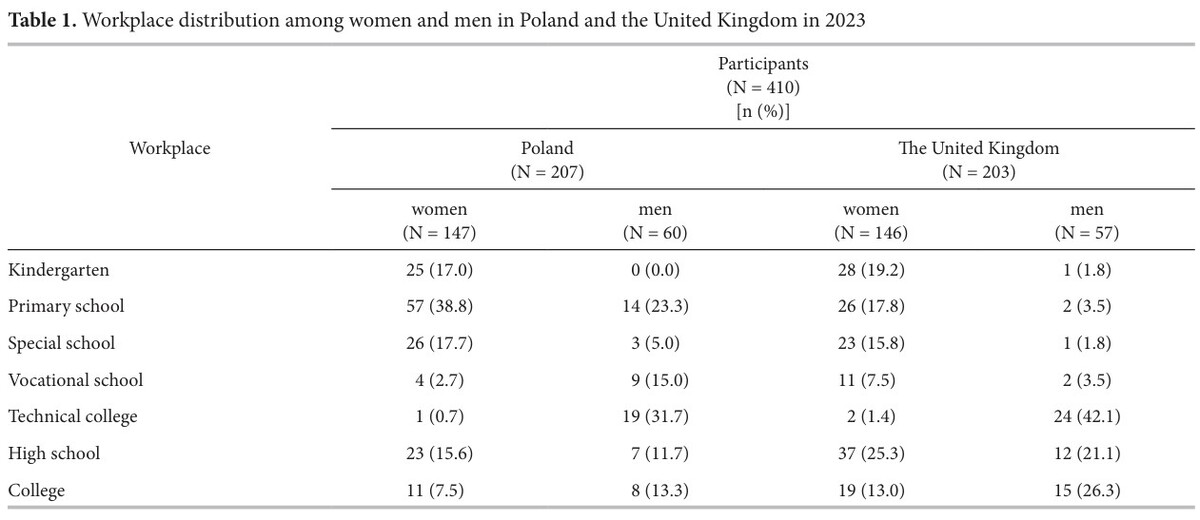Online first
Current issue
Archive
Most cited in 2024
About the Journal
Editorial Office
Editorial Board
Copyright and self-archiving policy
Information clause on the processing of personal data
Declaration of accessibility
Instructions for Authors
Instructions for Reviewers
Contact
Reviewers
2024
2023
2022
2020
2021
2019
2018
2017
2016
2015
2014
2013
Editing and translations
ORIGINAL PAPER
The levels of physical activity and fatigue among teachers in Poland and the United Kingdom in the first year after the COVID-19 pandemic
1
University of Lomza, Łomża, Poland
(Faculty of Health Sciences)
2
Rzeszow University of Technology, Rzeszów, Poland
(Plant of Quantitative Methods)
Online publication date: 2024-04-04
Corresponding author
Med Pr Work Health Saf. 2024;75(2):103-12
KEYWORDS
TOPICS
ABSTRACT
Background: The COVID-19 disease has a negative impact on the psychophysiological health of populations worldwide, including a decrease in overall physical performance and an increase in fatigue. Fatigue was one of the main symptoms reported by patients and persisted for several weeks after infection with COVID-19. Although the phenomenon of fatigue is still poorly understood, physical activity can be a supportive factor in combating feelings of fatigue and lack of energy. The purpose of this research was to assess the physical activity (PA) and fatigue levels of teachers in Poland and the United Kingdom in the first year after the COVID-19 pandemic. Material and Methods: The online research was carried out among 410 teachers from Poland and the United Kingdom. The PA level was assessed using the International Physical Activity Questionnaire (IPAQ). The level of fatigue was measured using the Modified Fatigue Impact Scale (MFIS). Results: Polish teachers, regardless of sex, are more physically active (the differences relate mainly to walking and moderate activity). When assessing the level of fatigue, there is a significant difference between men and women – the former indicate a higher degree of fatigue, with the difference between the sexes being particularly large in the Polish community. Quite clearly, there is an association between less activity (except walking) and more fatigue. All models show a statistically significant effect of total fatigue on total effort. Physical activity is not very strongly correlated with age but the level of fatigue increases with age. Conclusions: The problem of teacher fatigue is unfortunately widespread. They should be encouraged to engage in as much PA as possible during the day. When planning and targeting fatigue reduction campaigns, PA should be encouraged and variables such as age, sex should be taken into account. Med Pr Work Health Saf. 2024;75(2):103–112
ACKNOWLEDGEMENTS
This study was produced in collaboration with APSLEY
Business School London as a culmination of the authors’
research scientist internship (A.Z. and M.G.). The authors
would like to express their special thanks to prof. Kamil
Krzysztof Całek for the academic supervision during the internship
and the courtesy extended.
Share
RELATED ARTICLE
We process personal data collected when visiting the website. The function of obtaining information about users and their behavior is carried out by voluntarily entered information in forms and saving cookies in end devices. Data, including cookies, are used to provide services, improve the user experience and to analyze the traffic in accordance with the Privacy policy. Data are also collected and processed by Google Analytics tool (more).
You can change cookies settings in your browser. Restricted use of cookies in the browser configuration may affect some functionalities of the website.
You can change cookies settings in your browser. Restricted use of cookies in the browser configuration may affect some functionalities of the website.






